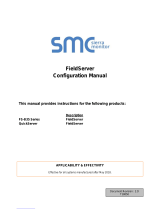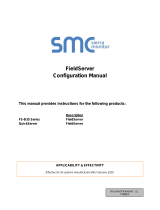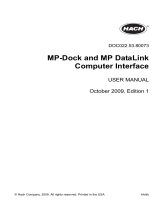Carrier Data Link Driver Manual
Table of Contents
TABLE OF CONTENTS
1 Carrier Data Link Description ............................................................................................................. 4
2 Driver Scope of Supply ....................................................................................................................... 4
2.1 Supplied by Sierra Monitor Corporation ......................................................................................... 4
2.2 Provided by the Supplier of 3
rd
Party Equipment............................................................................ 4
2.2.1 Required 3
rd
Party Hardware ................................................................................................... 4
3 Hardware Connections ........................................................................................................................ 5
4 Data Array Parameters ........................................................................................................................ 6
5 Configuring the FieldServer as a Carrier Datalink Client ................................................................ 7
5.1 Client Side Connection Parameters ............................................................................................... 7
5.2 Client Side Node Parameters ......................................................................................................... 8
5.3 Client Side Map Descriptor Parameters ......................................................................................... 8
5.3.1 FieldServer Specific Map Descriptor Parameters ................................................................... 8
5.3.2 Driver Related Map Descriptor Parameters ............................................................................ 9
5.3.3 Timing Parameters .................................................................................................................. 9
5.4 Map Descriptor Examples ............................................................................................................ 10
5.4.1 Read Entire Table ................................................................................................................. 10
5.4.2 Read a Variable ..................................................................................................................... 10
5.4.3 Write A Variable..................................................................................................................... 11
5.4.4 Write Day of Week (DOW) or Time ....................................................................................... 11
6 Configuring the FieldServer as a Carrier DataLink Server ............................................................ 12
6.1 Server Side Connection Descriptors ............................................................................................ 12
6.2 Server Side Nodes ........................................................................................................................ 13
6.3 Server Side Map Descriptors ........................................................................................................ 13
6.3.1 FieldServer Specific Map Descriptor Parameters ................................................................. 13
6.3.2 Driver Specific Map Descriptor Parameters .......................................................................... 14
6.3.3 Timing Parameters ................................................................................................................ 14
6.4 Map Descriptor Example .............................................................................................................. 15
Appendix A Advanced Topics ................................................................................................................. 16
Appendix A.1 Table Names ..................................................................................................................... 16
Appendix A.2 Using the Carrier Datalink Driver to Obtain Field Names ................................................. 18
Appendix A.3 Map Descriptor Length Explained ..................................................................................... 20
Appendix A.3.1 Client Reads a Table .................................................................................................. 20
Appendix A.3.2 Client Reads a Variable ............................................................................................. 20
Appendix A.3.3 Client Writes a Variable .............................................................................................. 20
Appendix A.3.4 Server ......................................................................................................................... 20
Appendix A.4 How the Client Stores the States/Values of the Table Variables...................................... 21
Appendix A.4.1 Discrete States ........................................................................................................... 21
Appendix A.5 Extending the List of Discrete State Words ...................................................................... 22
Appendix A.5.1 Time Values ............................................................................................................... 22
Appendix A.5.2 Numeric Values .......................................................................................................... 22
Appendix A.5.3 Occupancy Strings / Values ....................................................................................... 22
Appendix A.6 Timing Considerations ...................................................................................................... 23
Appendix B Carrier DataLink Device Error Response .......................................................................... 24
Appendix C Driver Notes .......................................................................................................................... 25
Appendix C.1 Driver Stats ....................................................................................................................... 25
Appendix C.2 Driver Limitations and Exclusions ..................................................................................... 27
Appendix D Driver Error Messages ......................................................................................................... 28
























